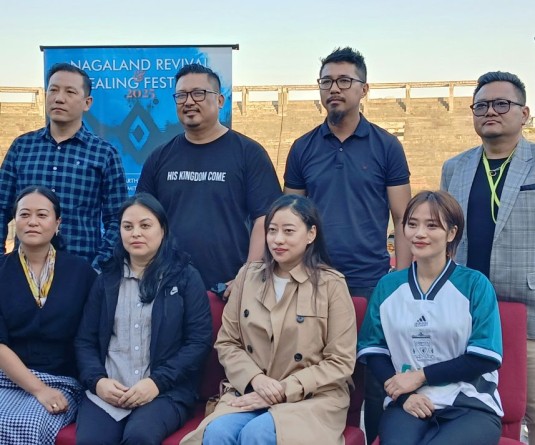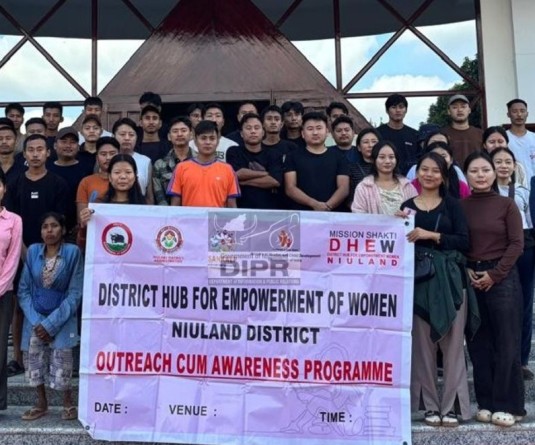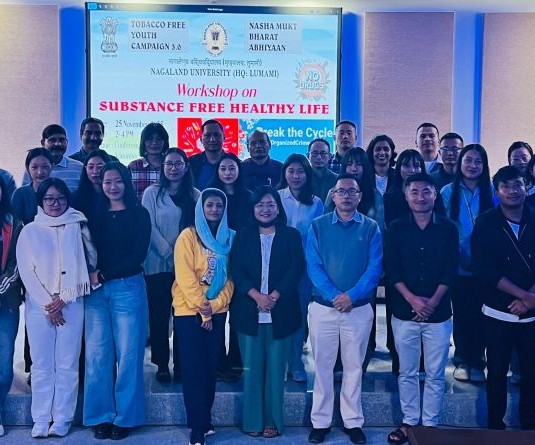Participants at the Morung Lecture on ‘Human Rights in Naga Society: Today and Tomorrow’ held on Saturday, April 2. (Photo by Satyen Bordoloi)
Morung Express News
Dimapur | April 3
Who will address human rights in Naga society today? The Morung Lecture held on Saturday, April 2 at the DABA’s Elim Conference Hall attempted to grapple with this question in a discussion held after the lecture delivered by Dr. Visakhonü Hibo, Principal of Japfü Christian College and Neingulo Krome, Secretary General of the Naga Peoples’ Movement for Human Rights.
Director of Peace Channel and Principal of NEISSR, Fr. CP Anto, wondered if people and organisations can come together to support existing bodies like NPMHR, Forum for Naga Reconciliation (FNR), ACAUT (Nagaland) in order to address human rights, and in raising specific issues? Can churches come together to address the deepening crises faced by society today?
While denominational challenges remain, it is time for churches of all denominations to come together in Nagaland to address these issues, concluded the session.
“The church is the solution and it needs to take a stand,” said Dr. Hibo during the course of the public discussion. Editor of The Morung Express, Dr. Aküm Longchari, said that it is time for the church to “overcome the facade of neutrality” in order to take a stand on what is right and wrong. Only then can it begin to help those who seek its shadow when their basic rights as human beings are abused.
The ‘Morung Lectures’ is an initiative of The Morung for Indigenous Affairs and Just Peace and The Morung Express, and attempts to open up a culture of dialogue in Naga society where options can be created without having to insist a singular position.
As Fr. Anto noted, the only way to resolve the current “mess” in society is through coming together in dialogue, planning and programming.
Among options raised, former bureaucrat and current activist, Khekiye K Sema, observed that the Government of India and the Naga people have now recognised that differences can be sorted out through mutual discourse. In such a scenario, the Armed Forces (Special Powers) Act has become irrelevant—can the Naga people let the GoI know through “sustained” public campaigns that the Act is undemocratic and no longer applicable?
Sema wondered whether NPMHR and ACAUT can work together against corruption – for the sake of accountability and transparency.
According to Neingulo Krome, while different organisations have their own limitations, the culture of impunity for the Indian army created by laws like AFSPA, later replicated by the Naga army—indeed raising the question of human rights—can be addressed by all as everyone has the “equal responsibility” to raise them.
NPMHR, he said, was started at a time (1978) when the people who joined it had little knowledge of human rights but they still worked hard given the situation in the Naga areas during the 1970s. Given the access to knowledge systems today, everyone can address the issue of human rights through their organisations by recognising the needs of the people.
This needs continual education on human rights through institutions or through people’s initiatives (NPMHR used to print human rights pamphlets before to educate the people). This can also be done through the publication of histories that remain unpublished till date like the abuses that the people in Eastern Nagaland went through from 1955-58 when the Indian army first attacked the region through the Eastern sphere, informed Toshi Wuntung, adviser to the Eastern Naga Peoples’ Organisation.
Today, however, the horizon of human rights needs to be expanded beyond what NPMHR could do, asserted Krome. It is in this expansion that the human rights discourse in Naga society has failed, particularly the Government of Nagaland as well as civil society.
Citing a basic example of abuse, Dr. Hibo pointed out how the society has denied children their right to a just life—how Naga children from downtrodden areas are made to work like “slaves” in well-to-do Naga homes. In this context, many among the audience expressed the opinion that given a tumultuous history, the discourse on Human Rights in Naga society is predominated by this political question, which, at times, results in neglecting other aspects associated with rights.





